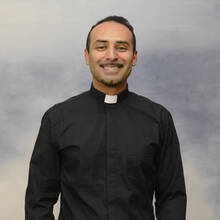Real Nourishment for the Skeptical and Starving Alike
For the past three Sundays the liturgical readings have focused on Jesus as the bread of life. There are two more Sundays left for this Eucharistic pondering. By now audiences at Mass are probably convinced of the primary argument, except for the fact that there is no real argument other than a statement of faith repeated extensively. “I am the living bread that came down from heaven,” says Jesus, “whoever eats this bread will live forever” (Jn 6:51). In lieu of an actual argument, today’s passages invite the reader to contemplate real nourishment as opposed to figurative “food” for life’s journey.
For my flesh is true food, and my blood is true drink. (Jn 6:55)
How much space do you provide in your life for mystery?
In what way is the Eucharist real nourishment for life’s journey?
Which hunger do you most need Jesus to satisfy?
Important elements of life require no argument of necessity. There is no deliberation for the things people need: sleep, food, water, health, love, affection and safety. One could argue that there are also pressing necessities that are harder to articulate, like the need for creativity, fun and spiritual communion. In response to all of this and more, the Gospel of John provides a reflective moment to contemplate: “The bread that I will give is my flesh for the life of the world” (Jn 6:51).
Today’s passage anticipates the rejection or misinterpretation of the bread of life discourse as material, non-figurative nourishment. Later in this passage, even the disciples of Jesus will continue to doubt Jesus’ words as literal ones. Their rejection is not unreasonable, since figurative and symbolic language about spiritual food is perfectly at home within Scripture. “Wisdom has built her house,” one reads in today’s first reading; “Come, eat of my food, and drink of the wine I have mixed!” (Prv 9:1, 5). For the second week in a row, Psalm 34 has repeated, “Taste and see the goodness of the Lord.” There is no theological reason, nor a biblical one, to not take Jesus’ words as symbolic nourishment for the soul like food to the body.
What one reads in today’s passage, however, is a refusal to accept the figurative interpretation. Jesus responds insistently, “For my flesh is true food, and my blood is true drink” (Jn 6:55). If there is any doubt to this, Jesus repeats the statement of faith in different ways. For example, “Whoever eats my flesh and drinks my blood remains in me and I in him” (Jn 6:56).
This all becomes a teaching moment at the synagogue in Capernaum. In response to all the demanding needs of people in hunger, Jesus says that he is true food and true drink. The people inside the synagogue are faced with every level of hunger, from spiritual to emotional to physical hungers, and must at least consider how Jesus is able to satisfy all of it: This must be nonsense!
Jesus does not change course. “The one who feeds on me will have life because of me” (Jn 6:57). There are two directions this bread of life discourse may take: as spiritual-figurative nourishment or as nourishment without restriction. The Catholic interpretation is radical. Do you have Covid? Take Jesus as medicine. Are you hungry? Feed off Jesus. Dying of thirst? Drink Jesus’ blood. Feeling mentally tired and emotionally unstable? Receive Jesus as true food and true drink.
Theologians have attempted to provide a reasonable way to think about the real nourishment of Christ in the Eucharist. The premier articulation comes down from Thomas Aquinas. Scripture is different. In Scripture, the real nourishment of Jesus as flesh and drink for a hungry world remains a mystery. It is not, however, a figurative type of nourishment. “Whoever eats this bread will live forever” (Jn 6:58).
There remains one last thing to consider. As a mystery, there is a hint from the passages being read this Sunday and next that the best candidates to receive this hard teaching of real nourishment are the ones who feel the pangs of hunger—that is, the poor. “The rich grow poor and go hungry, but those who seek the Lord lack no good thing” (Ps 34:11). Next Sunday anticipates the poor ones left with nothing but Jesus’ words of eternal life.








